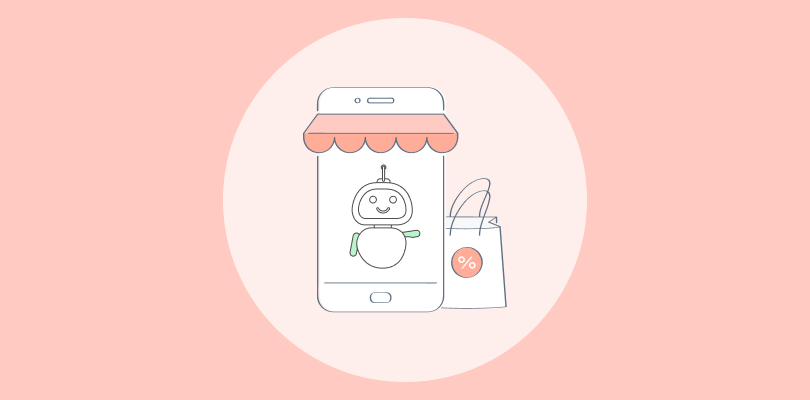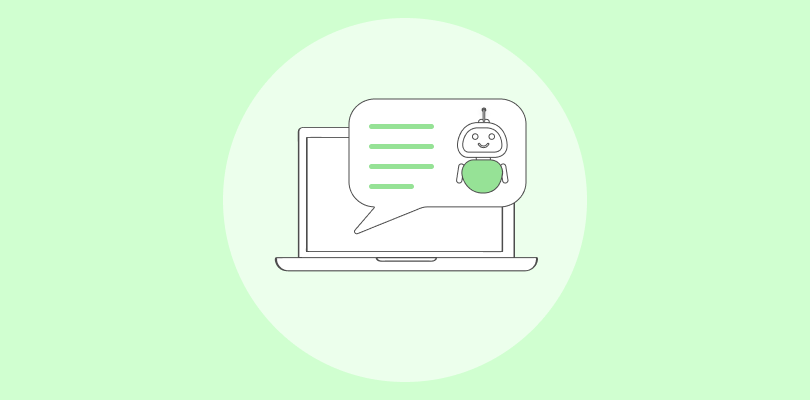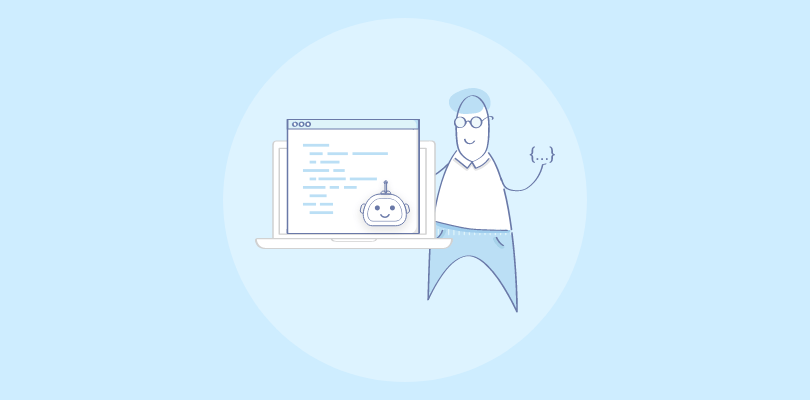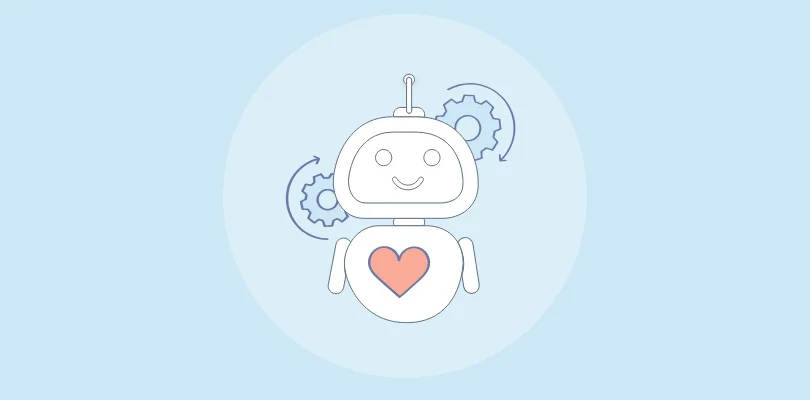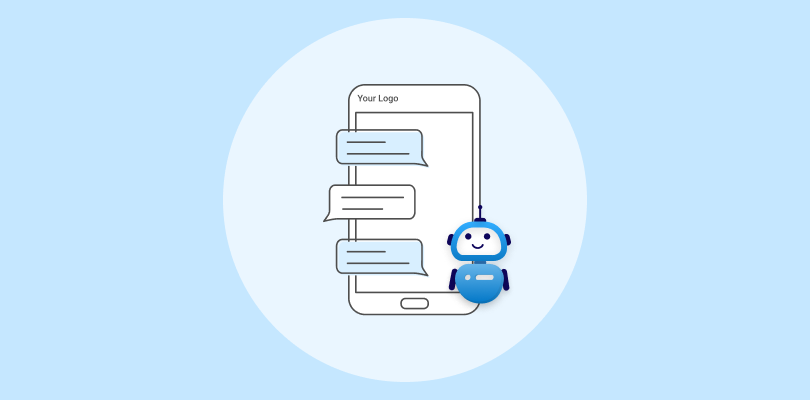In the past, I’ve witnessed a fascinating transformation in healthcare.
For instance, earlier people spent a lot of time trying to schedule appointments or decipher confusing medical bills. But thanks to healthcare chatbots, these struggles are a thing of the past. These virtual assistants are making waves, offering patients instant access to information and simplifying everyday healthcare tasks.
As a part of the live chat industry, I have witnessed immense growth in the potential of chatbots, especially in the medical field.
So, here’s a blog that unveils the amazing world of chatbots in the medical field, including healthcare chatbot use cases, benefits, how to create them, and their amazing future for patient care.
Let’s get started.
What is a Healthcare Chatbot?
A healthcare chatbot is an AI-driven tool designed to simulate conversation and assist patients and healthcare providers. These chatbots can handle a range of tasks, from scheduling appointments to providing medical advice and facilitating patient monitoring.
According to a study by Juniper Research, chatbots will be responsible for cost savings of over $3.7 billion by 2023 for the healthcare industry, showcasing their efficiency and economic benefit.
For example, the chatbot “Molly” by Sensely uses machine learning to support patients with chronic illnesses by monitoring their condition and providing advice. Similarly, “Babylon Health” offers a chatbot that conducts initial medical consultations based on personal medical history and common medical knowledge.
These technologies not only improve accessibility and streamline processes but also enhance patient engagement by offering 24/7 assistance, demonstrating the significant impact of AI in modernizing healthcare services.
Top 10 Use Cases of Healthcare Chatbots
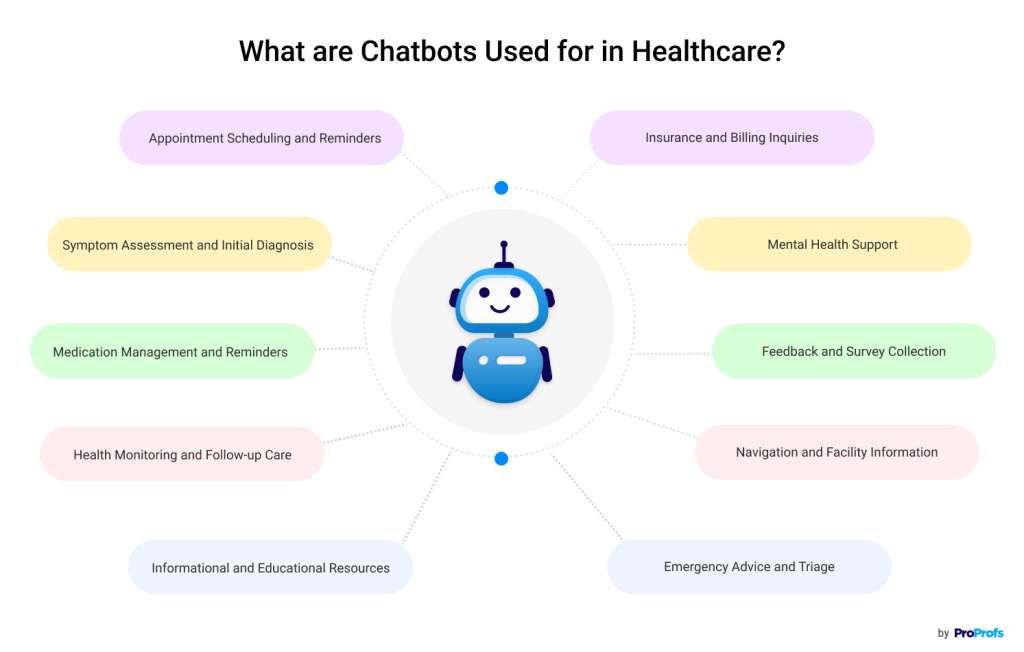
The use of chatbots in healthcare is becoming increasingly popular for their ability to streamline interactions between patients and healthcare systems.
Here are some of the most important use cases for medical chatbots:
1. Appointment Scheduling and Reminders
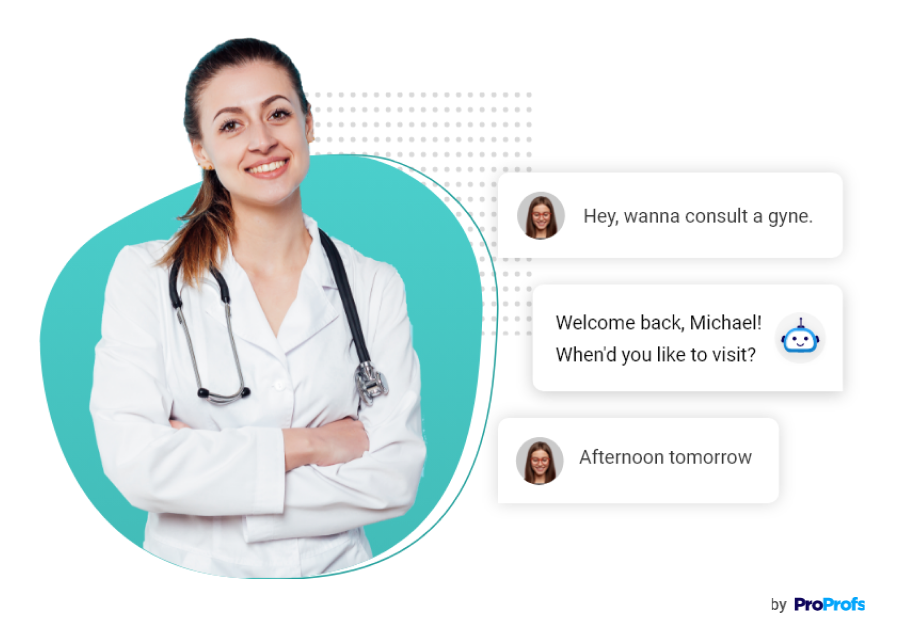
Appointment scheduling chatbots automate the scheduling process, making it easier for patients to find available times and book them without human intervention. They can also send automated reminders to ensure patients remember their appointments, reducing no-show rates.
Example: A patient interacts with a chatbot to find an available time slot and book an appointment with their general practitioner. The chatbot later sends a reminder a day before the appointment.
2. Symptom Assessment and Initial Diagnosis
AI-powered chatbots can be used for medical diagnosis. They can analyze the symptoms described by patients, suggest possible medical conditions, and recommend whether professional healthcare advice is necessary. This tool helps in early detection and provides guidance on the urgency of seeking medical attention.
Example: A user describes their symptoms to the chatbot, which uses an algorithm to suggest possible conditions and advises whether to visit a doctor or handle the issue at home.
3. Medication Management and Reminders
These chatbots assist patients in managing their medication schedules, providing reminders at designated times to help maintain the consistency of treatment, which is particularly critical for chronic conditions like diabetes or hypertension.
Example: A chatbot sends daily reminders to patients to take their diabetes medication and asks for confirmation once the medication is taken.
4. Health Monitoring and Follow-up Care
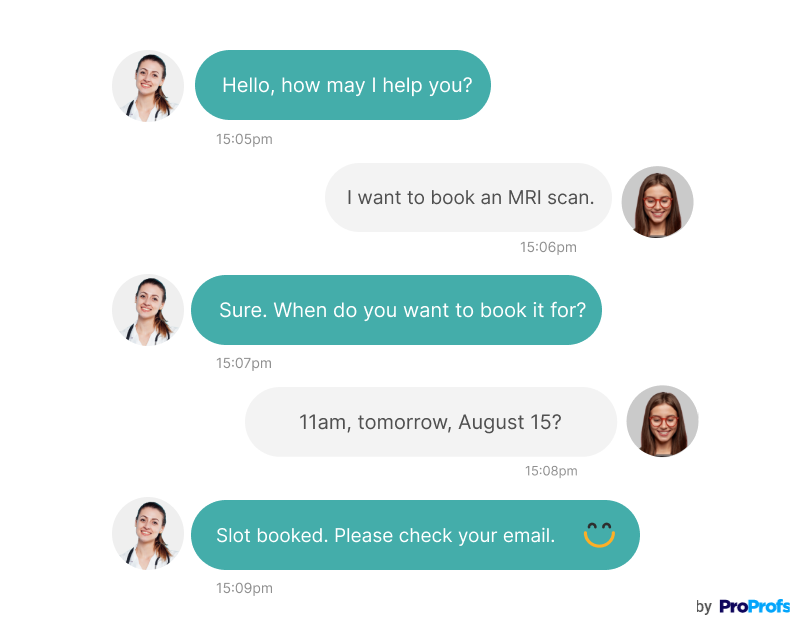
Chatbots engage in regular communication with patients to monitor their health status, especially after surgeries or during the management of chronic diseases, thereby helping in continuous care and early identification of potential complications.
Example: A post-operative patient reports their pain levels and wound status to a chatbot, which assesses whether the healing process is on track.
5. Informational and Educational Resources
These chatbots serve as a 24/7 resource for patients seeking to learn more about various health conditions, treatment options, and preventive healthcare, making complex medical information more accessible and understandable.
Example: A patient asks a chatbot about managing high blood pressure, and the chatbot offers diet and lifestyle tips along with some helpful resources on how blood pressure affects health.
6. Insurance and Billing Inquiries
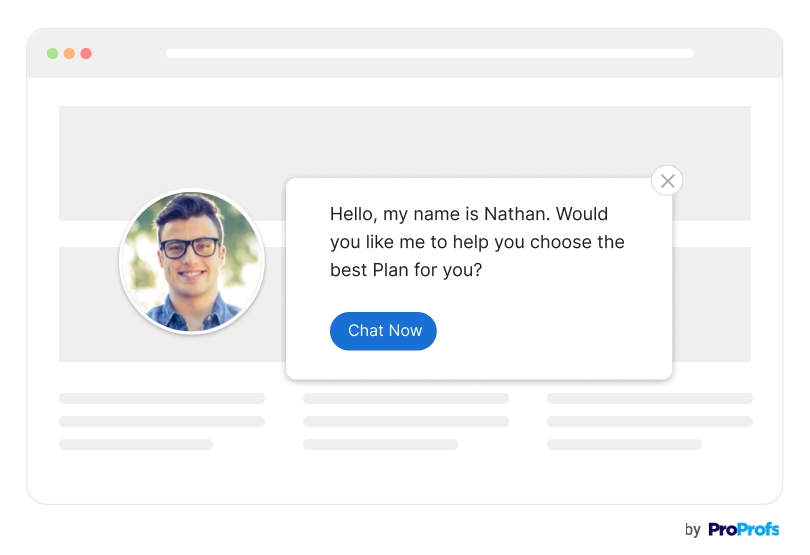
Chatbots handle queries related to insurance coverage, help clarify benefits, and guide patients through the often complex billing process, enhancing patient satisfaction and administrative efficiency.
Example: A chatbot assists a patient in understanding what aspects of a medical procedure are covered by their insurance and how much they need to pay out-of-pocket.
7. Mental Health Support
Healthcare chatbots can be designed to offer psychological support, helping patients understand and manage symptoms of conditions like anxiety and depression. They can provide immediate coping strategies and maintain regular interaction, serving as a preliminary support tool.
Example: A chatbot conducts daily check-ins for a user undergoing therapy for anxiety, providing breathing exercises and mindfulness activities.
8. Feedback and Survey Collection
Healthcare providers use chatbots to efficiently gather patient feedback on services and experiences, which is crucial for continual improvement and patient satisfaction assessment.
Example: After a hospital visit, a patient interacts with a chatbot to rate the service and provide feedback on their experience.
9. Navigation and Facility Information
Chatbots help patients and visitors navigate large medical facilities, providing real-time directions to departments, specialists, or amenities, which enhances the visitor experience and operational efficiency.
Example: A chatbot guides a visitor through a large hospital to the appropriate department, providing directions and estimated walking times.
10. Emergency Advice and Triage
In critical situations, chatbots can provide immediate guidance and first-aid information. They help in assessing the severity of symptoms and decide the urgency of seeking medical help, potentially saving lives through early intervention.
Example: A user tells the chatbot they are experiencing chest pain, and the chatbot quickly guides them through symptoms of a heart attack and advises calling emergency services if certain conditions are met.
Do Not Miss: 12 Chatbot Mistakes That Can Be Fatal for Your Business
What are the Types of Chatbots in Healthcare?
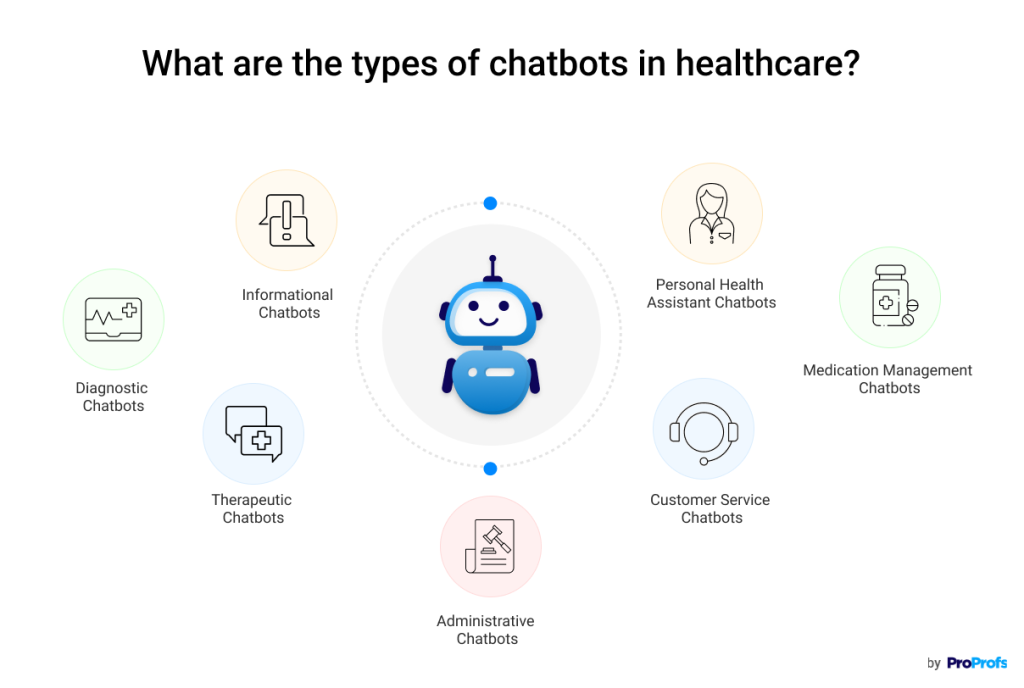
Chatbots in healthcare offer various services that enhance patient care, improve administrative efficiency, and provide support for both patients and healthcare providers.
Here are several types of chatbots commonly found in the healthcare industry:
- Informational Chatbots: These chatbots provide general health information, similar to an interactive FAQ. They can answer common questions about diseases, medications, and health guidelines, helping to educate patients and reduce the workload on human staff.
- Diagnostic Chatbots: These use AI algorithms to analyze symptoms described by users and suggest possible diagnoses. They often guide users through a series of questions to narrow down symptoms and provide advice on whether to seek professional medical help.
- Therapeutic Chatbots: Designed to support mental health, these chatbots engage users in conversation to help manage conditions like depression, anxiety, and stress. They can deliver cognitive-behavioral therapy (CBT) or other therapeutic techniques in a more accessible and private manner.
- Administrative Chatbots: These are used to streamline healthcare operations, such as scheduling appointments, sending reminders for medication, handling prescription renewals, and managing billing queries. This reduces administrative burden and improves patient satisfaction.
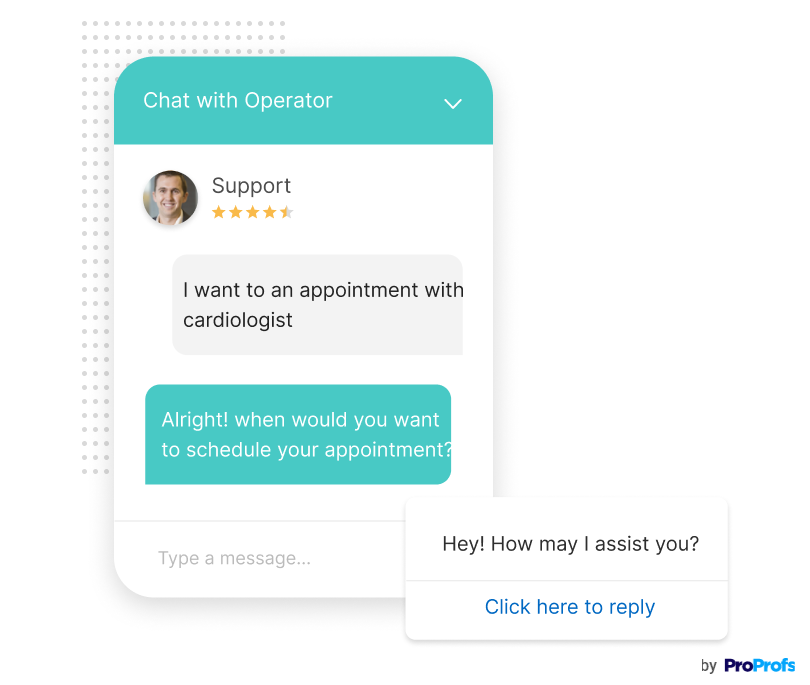
- Personal Health Assistant Chatbots: These chatbots monitor patient health data over time, providing personalized reminders and health tips. They can integrate with wearable technology to track health metrics like heart rate and physical activity, helping users manage chronic conditions or maintain healthy lifestyles.
- Medication Management Chatbots: These help patients manage their medication schedules, remind them when to take their pills, warn them about potential drug interactions, and provide information about side effects and medication adherence.
- Customer Service Chatbots: Often deployed on insurance and healthcare provider websites, these chatbots answer inquiries related to policy details, coverage questions, claims status, and more, improving customer service and operational efficiency.
Each type of chatbot serves distinct functions and meets different needs within the healthcare system, contributing to more personalized care, enhanced access to information, and overall improved efficiency in healthcare services.
Read More: 5 Types Of Chatbot That Can Help Your Business Grow 10X
What are the Benefits of Chatbots in Healthcare?
Here are some of the major benefits of chatbots in the medical and healthcare sector:
Stay Available 24/7
Chatbots in healthcare provide uninterrupted support, answering patient inquiries at any time of the day or night. This 24/7 availability ensures that patients receive immediate answers to their questions, reducing wait times and significantly enhancing patient satisfaction.
For instance, HealthTap’s chatbot implementation reported a 50% decrease in patient wait times, illustrating the substantial impact on efficiency and accessibility in healthcare services.
Offer Immediate Assistance to Patients
Healthcare chatbots offer instantaneous responses to patient queries, which is particularly crucial in emergency situations where immediate advice is needed.
This capability not only enhances patient experience but also plays a critical role in managing urgent health issues by guiding patients on necessary actions, such as the Ada Health app, which provides real-time advice based on symptoms, potentially preventing severe health outcomes.
Reduce Operational Support Costs
Implementing chatbots in healthcare settings dramatically reduces operational costs by automating routine inquiries and administrative tasks that traditionally require human labor.
A study by Juniper estimated that chatbots could save the U.S. healthcare system approximately $3.6 billion annually. These savings stem from reduced labor costs and improved efficiency in handling administrative processes such as patient inquiries and appointment scheduling.
Boost Patient Engagement
Chatbots significantly improve patient engagement by facilitating personalized interactions. They send timely reminders for medication and appointments, which help patients adhere to their treatment plans.
For example, a clinical trial indicated a 40% improvement in appointment adherence rates when chatbots were used to remind patients, showcasing their effectiveness in enhancing treatment compliance and health outcomes.
Automate Data Collection
Chatbots are invaluable for collecting and analyzing patient data, allowing for better monitoring and customization of care. They enable continuous data collection, which healthcare providers can use to adjust treatments based on real-time feedback.
For instance, the chatbot Molly by Sense.ly utilizes patient interaction data to modify and improve individual treatment plans, demonstrating the potential for adaptive care strategies.
Enhance the Accessibility
Chatbots enhance the accessibility of healthcare services, especially for individuals in remote areas or those with mobility challenges. They allow patients to access medical advice and services online, reducing the need for physical travel.
During the COVID-19 pandemic, the CDC’s chatbot played a crucial role by helping users assess their symptoms remotely and directing them to nearby testing facilities, thereby maintaining essential health services during a public health crisis.
Provide Mental Health Support
Healthcare chatbots provide initial support for mental health concerns, offering a resource for individuals to discuss issues like anxiety and depression.
Bots like Woebot, which employs cognitive-behavioral therapy techniques, offer a conversational platform for mental health support, easing the burden on professionals and delivering preliminary care, which can be crucial in managing the increasing demand for mental health services.
Serve as an Educational Tool
Chatbots serve as powerful educational tools, delivering accurate health information and reducing the spread of misinformation.
Platforms like Babylon Health provide users with evidence-based medical advice and detailed explanations of various health conditions. This promotes better understanding and health literacy among patients, enabling them to make informed decisions about their health and treatment options.
Streamline Workflow
Chatbots streamline healthcare workflows by automating administrative tasks such as scheduling, patient intake, and follow-up communications. This optimization enhances clinic operations, reduces administrative burdens, and improves service delivery.
For example, the Florence chatbot not only automates prescription refills but also tracks patients’ health daily, demonstrating the multifaceted benefits of chatbots in managing healthcare logistics.
- Handle Peak Loads:
Chatbots are particularly effective during peak periods of patient inquiries, such as during flu season or public health emergencies. They manage the excess load by handling routine inquiries, ensuring that all patients receive timely information and support without overwhelming healthcare staff.
This capacity was clearly demonstrated during past influenza seasons, where chatbot deployment in clinics and hospitals ensured efficient patient care and reduced the strain on healthcare resources.
Also Read: Top 15 Benefits of Chatbots for Your Business & Customer in 2024
FREE. All Features. FOREVER!
Try our Forever FREE account with all premium features!
How to Create a Chatbot for Your Healthcare Website
In order to add a chatbot to your healthcare website, you would need to create it using an online chat tool, such as ProProfs Chat.
Here are some simple steps to add a chatbot to your website using the ProProfs Chat tool.
- Log in to the ProProfs Live Chat account and go to Bots in the top navigation banner.
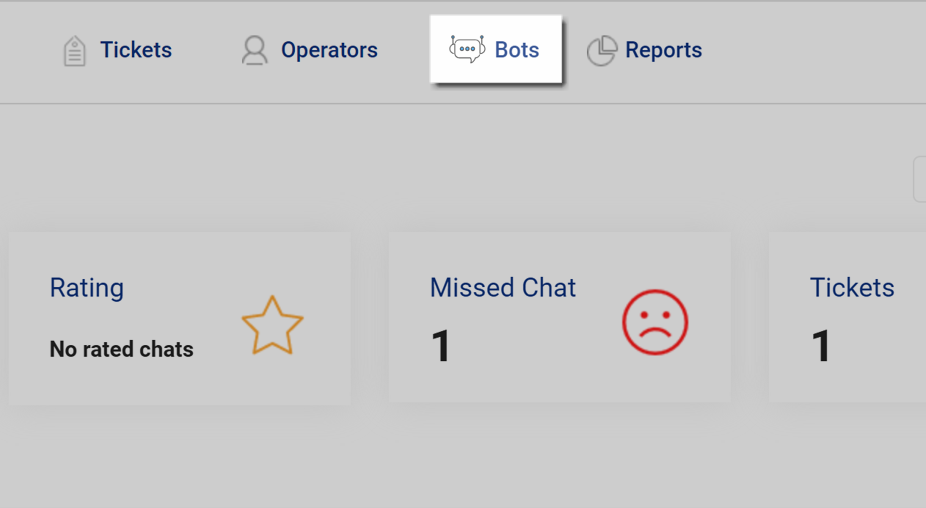
- Go to the Create New Bot button. You can select any of the options from “Using AI”, “Create From Scratch,” or “Create Using Templates”. Here, let’s create a chatbot using AI.
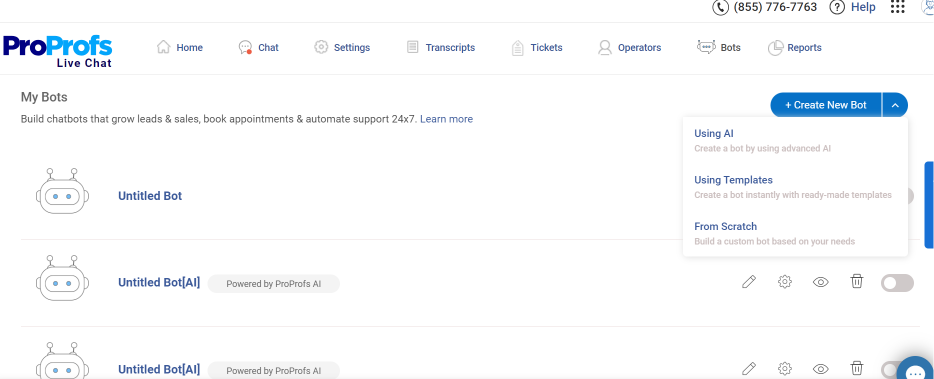
- Now, you need to configure your bot with data. You can do this in two ways:
- URL: Enter your website’s URL in the “Website URL” field. This lets the system automatically gather information from your site, like FAQs and product details.
- Text: If you don’t want to use your website or need to add extra details, you can type in the information manually. This is great for specific instructions, policies, or any other important info you want the bot to know.

Select your preferred data source method and provide the necessary information. Then, click “Process Data” to proceed.
- Once the website data is processed, click “Start Training.”
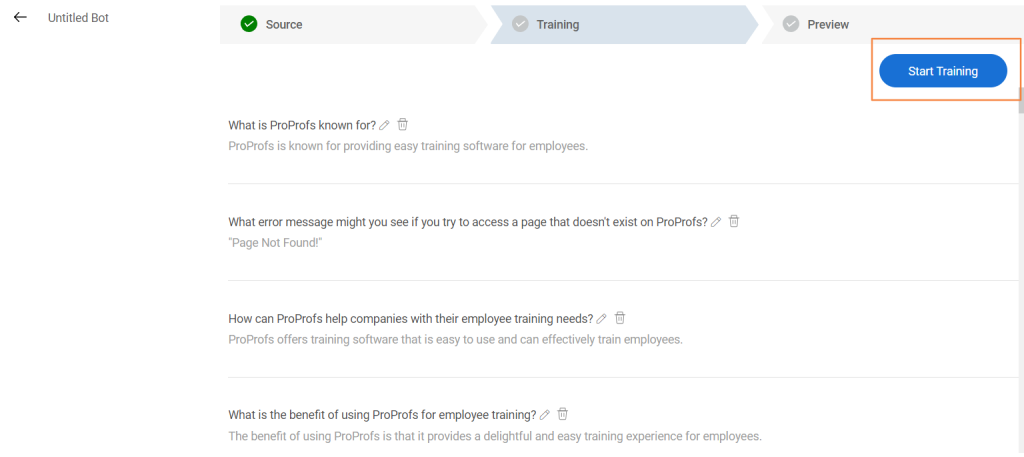
- After this process, you will have two options. You can finalize your bot by clicking “Yes, I’m ready” based on the current data. If you want to adjust the data your bot has learned from, choose “Modify Data Source” to make changes.
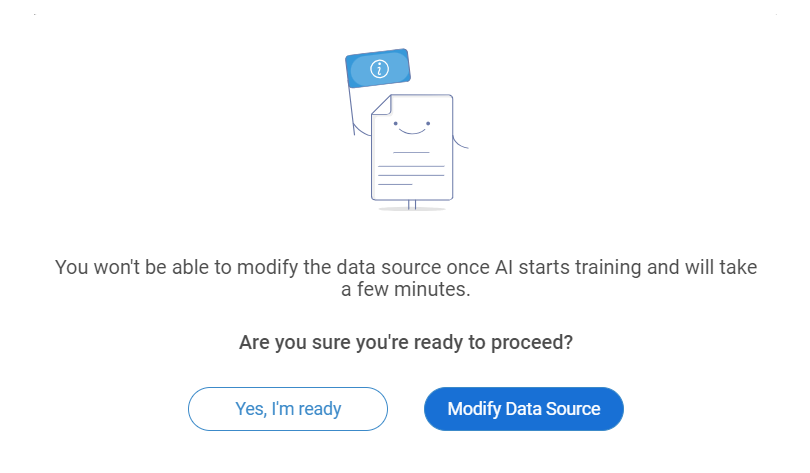
- Now, click “Preview” to see your bot working.

Ta-da! You just created your first chatbot.
Future Trends in Healthcare Chatbots
Here are some key trends we might see with respect to the future of healthcare chatbots:
Advanced Natural Language Processing (NLP)
Future healthcare chatbots are expected to leverage more sophisticated NLP capabilities. This will enable them to understand and process user inputs with greater nuance, manage more complex conversations, and provide more accurate responses, mimicking human-like interactions more closely.
Integration with Electronic Health Records (EHRs)
Chatbots will likely be more deeply integrated with EHR systems, allowing them to access and analyze patient data in real time. This integration will enable personalized healthcare advice and reminders tailored specifically to the patient’s medical history and current health status.
Expanded Use Cases
Beyond answering basic queries and scheduling appointments, future chatbots in healthcare might handle more complex tasks like initial symptom assessment, mental health support, chronic disease management, and post-operative care. This would help reduce the workload for human healthcare providers and improve patient engagement.
Read More: Live Chat vs Chatbots: A Detailed Comparative Analysis
Enhanced Security and Privacy
As healthcare chatbots handle sensitive medical information, ensuring data security and compliance with regulations like HIPAA (in the U.S.) will become even more critical. Future developments will likely include enhanced encryption methods and more robust privacy safeguards to protect patient data.
Multilingual Support
To cater to diverse populations, healthcare chatbots will increasingly support multiple languages. This inclusivity will help in delivering equitable healthcare advice and support to non-native speakers and underserved communities.
Predictive Analytics
Utilizing machine learning algorithms, chatbots will interact with patients and predict potential health issues before they become serious based on user interactions and available health data. This could lead to preventative healthcare measures that could save lives and reduce healthcare costs.
Human-AI Collaboration
Rather than replacing healthcare professionals, chatbots are expected to become a tool that complements them. AI will assist healthcare providers by providing them with decision support, predictive insights, and routine task automation, allowing them to focus more on patient care.
These trends suggest a future where healthcare chatbots are an integral part of the medical ecosystem, improving both the efficiency of care providers and the health outcomes of patients.
Also Read: Top 10 Free AI Chatbot Software in 2024 [With Pros & Cons]
Improve Medical Attention with Healthcare Chatbots
Healthcare chatbots have demonstrated their potential to transform the landscape of medical care. By providing timely, personalized responses and freeing up healthcare professionals to focus on more complex tasks, these AI-driven tools signify a pivotal shift toward more efficient and accessible healthcare systems. This evolution promises significant improvements in both patient outcomes and operational efficiencies across healthcare settings.
For healthcare websites looking to capitalize on this emerging trend, tools like ProProfs Chat offer a robust solution for creating efficient and reliable healthcare chatbots. You can use such tools to enhance user engagement and satisfaction in the medical field, helping to meet the evolving needs of patients and healthcare providers alike.
Learn More About Healthcare Chatbots
How much does it cost to develop a healthcare chatbot?
The cost of developing a healthcare chatbot can vary widely depending on various factors. Factors influencing the cost include the complexity of the chatbot's capabilities, the sophistication of its natural language processing technology, compliance with healthcare regulations like HIPAA, and whether it integrates with existing systems. Ongoing maintenance and updates also contribute to the overall expense.
Is it difficult to create a healthcare chatbot?
Creating a healthcare chatbot involves several complexities due to the need for compliance with healthcare regulations, sophisticated natural language processing capabilities, and secure handling of sensitive personal health information. The technical challenge increases if the chatbot requires integration with existing healthcare systems and databases. However, many platforms now offer tools that simplify the creation process, although expertise in both healthcare and technology is crucial.
What is the future of healthcare chatbots?
The future of healthcare chatbots looks promising, with advancements in AI and machine learning enhancing their accuracy and capabilities. Future chatbots are expected to offer more personalized and predictive healthcare solutions, including diagnosing conditions and recommending treatments based on patient data analysis. Integrating IoT devices and broader healthcare systems could further extend their usefulness, potentially transforming patient care delivery.
What are the most popular healthcare chatbot platforms?
Some of the most popular healthcare chatbot platforms include Ada Health, Babylon Health, and HealthTap. These platforms specialize in offering AI-driven advice, triage services, and health assessments. Microsoft’s Healthcare Bot service also enables the creation of compliant, scalable healthcare-specific chatbots, providing templates and tools tailored for healthcare scenarios. You can also create your own chatbot for any sector using free tools such as ProProfs Chat.
 Tips
Tips
We’d love to hear your tips & suggestions on this article!
FREE. All Features. FOREVER!
Try our Forever FREE account with all premium features!


 We'd love your feedback!
We'd love your feedback! Thanks for your feedback!
Thanks for your feedback!


